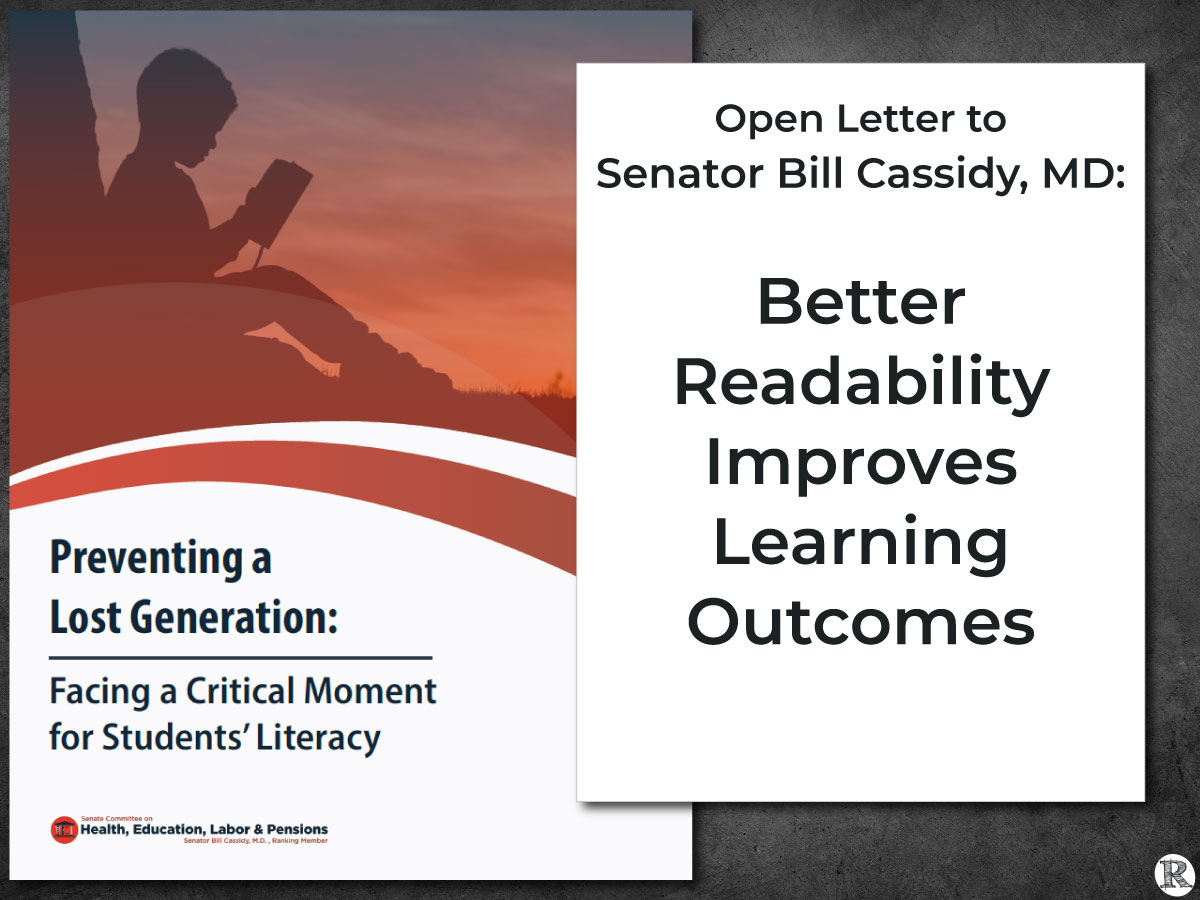US Senator Bill Cassidy, MD
Calls for Feedback on Improving Literacy
US Senator Bill Cassidy, the Ranking Member of the Senate Health, Education, Labor, and Pensions (HELP) Committee, released a February 2024 report on child literacy, highlighting significant challenges American children face in acquiring fundamental reading skills. Cassidy emphasizes the need for bipartisan action to address these issues and implement effective strategies to ensure all children attain proficient reading levels. The report calls for feedback from educators, policymakers, and the public to inform future initiatives to improve child literacy nationwide.
Literacy – the basic ability to read – is at the heart of all other learning. If students do not learn to read, they cannot read to learn in other subjects.
Senator Bill Cassidy, MD
See the full report here: https://www.help.senate.gov/ranking/newsroom/press/ranking-member-cassidy-releases-troubling-report-on-child-literacy
The Readability Matters Response to Senator Cassidy
Hello Senator Cassidy,
Thank you for your document, “Preventing a Lost Generation: Facing a Critical Moment for Student’s Literacy,” and your call for feedback.
Recent interdisciplinary research demonstrates that letter shape, size, and spacing all meaningfully impact reading speed and comprehension. For students, simple typographical changes to text format can produce an immediate 20% increase in reading fluency and a simultaneous 20% increase in reading comprehension. (Sheppard et al.)
Critical to the discussion of literacy is the role of personalization. Text format personalization improves reading outcomes for children and adult learners, strong, struggling, and dyslexic readers, and has been shown to impact math tasks in addition to text reading.
The proliferation of technology deployed during the pandemic creates new opportunities; technology enables us to optimize reading text formats for the individual.
Text personalization is a foundational element that improves the effectiveness of instruction in all five key pillars of literacy development. Students should not complete reading assignments or assessment tasks in a one-format-fits-all model when the provided text format impedes their performance.
Personalized text formats ensure more equitable opportunities and outcomes for all students. They allow more students to enjoy and fully engage in learning, shifting educational trajectories and allowing students to thrive. Personalized text formats enhance learning experiences, delivering social and emotional benefits, including increased confidence. Reading success creates more motivation to read, which in turn creates more learning, and the virtuous cycle repeats. What might our students achieve when they experience increased reading success?
A student’s issue with the physical mechanics of reading is rarely considered and can be hard to identify. Students wrongly assume that the problem is with them. With format changes, they can successfully access the meaning of the written words. The problem is not the reader; it is the reading material. “When Readability Format becomes a support rather than a barrier, students can build and leverage their reading strengths across all of their education.” (Dr. Susanne Nobles, ReadWorks)
We would ask the federal and each state government to encourage technology, edTech, and publishing companies to integrate features that enable text personalization. Governments should direct funds toward readability research. School districts should participate in the research required to create evidence-based solutions and low-overhead implementation models to achieve scale quickly.
There is substantial research demonstrating the benefits of text format personalization. Research must continue, ensuring the development of new high-quality reading format assessment tools. However, we must be pragmatic; we can train educators and start by deploying the features that can be delivered today to instantaneously enhance a student’s literacy skills and encourage engagement in lifelong learning.
Thank you for your consideration.
Best regards,
Marjorie Jordan and Kathy Crowley
Founders, Readability Matters
Readability Matters is a tech-for-good nonprofit organization with the mission to engage an ecosystem of partners to deliver personalized reading environments, empowering everyone everywhere to achieve more. With Adobe, Google and the University of Central Florida, Readability Matters founded The Readability (research) Consortium.




